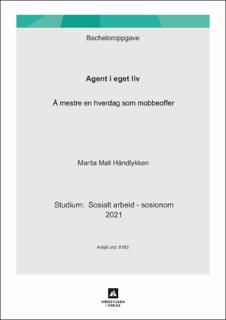Agent i eget liv. Å mestre en hverdag som mobbeoffer
Bachelor thesis
Permanent lenke
https://hdl.handle.net/11250/2763346Utgivelsesdato
2021Metadata
Vis full innførselSamlinger
Sammendrag
Formålet med denne oppgaven er å belyse tema rundt mobbing, og om hvordan barn og ungdom som opplever å bli mobbet skal kunne ved hjelp av tilhørighet og mestring bli det Bandura beskriver som agent i eget liv. Oppgavens problemstilling er: Hvordan kan man som sosialarbeider i skolen hjelpe barn og ungdom som blir mobbet med å bli agent i eget liv? For å kunne svare på denne problemstillingen har oppgaven tre forskningsspørsmål som omhandler hvordan tilhørighet kan styrke mestring, hvordan følelsen av mestringsevne kan motvirke mobbing, og hvordan sosialarbeideren møter barn og ungdom som opplever mobbing på en god måte.
Mobbing er et stadig pågående problem i den norske skolen, og konsekvensene mobbing kan ha for de som blir mobbet er mange. Det er derfor viktig å se på hvordan barn og ungdom som blir mobbet kan bli agent i eget liv. Som sosialarbeider er det viktig i samarbeid med andre profesjoner i skolen å skape et trygt og godt skolemiljø der alle elevene føler seg som en del av fellesskapet. Det å føle på tilhørighet kan føre til økt selvverd som igjen kan styrke følelsen av mestringsevne. Å ha sterk følelse av mestringsevne kan gjøre at et barn eller en ungdom kan enklere ta styring over vanskelige situasjoner, og dermed bli agent i eget liv.
Emneord: agent i eget liv, mobbing, tilhørighet, følelse av mestringsevne, sosialarbeiderrollen, skolemiljø, anerkjennelse Abstract
The purpose of this assignment is to shed light on topics around bullying, and how children and adolescents who experience bullying should be able to become agent in their own life, or “human agency” as Bandura calls it, with the help of belongingness and self-efficacy. The problem being discussed is: how can you as a social worker at school help children and adolescents who are bullied become agents in their own life? To be able to answer this problem, the assignment has three research questions that deal with how belonging can strengthen self-efficacy, how self-efficacy can help with preventing bullying, and how the social worker meets children and adolescents who experience bullying in a good way.
Bullying is an ongoing problem in the Norwegian school, and the consequences bullying can have for those who are bullied are many. Because of this, it is important to look at how children and adolescents who are bullied can become agents in their own lives. As a social worker, it is important in collaboration with other professions in school to create a safe and good school environment where all students feel part of the community. Feeling belonging can lead to increased self-esteem, which in turn can strengthen self-efficacy. Having strong self-efficacy can make it easier for a child or adolescent to take control of difficult situations, and thus become an agent in their own life.
Key words: human agency, bullying, belonging, self efficacy, the social workers role, school environment, recognition
